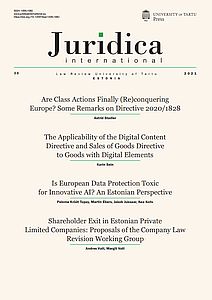Die funktionale Methode bei der Rechtsvergleichung
DOI:
https://doi.org/10.12697/JI.2021.30.09Keywords:
functional method, comparative law, Ernst Rabel, <i>praesumptio similitudinis</i>, CISG, UNIDROITAbstract
The article deals with the nature and versatile application of the functional method, a tool used in comparative law to examine institutions of the law across jurisdictions. The approach has played a role in projects to render laws uniform and contributed to the modernisation of the German Civil Code. Although the functional method is regarded as the most fundamental technique in comparative law, neither Ernst Rabel nor well-known adherents such as Konrad Zweigert and Hein Kötz expressed any precise strategy for functional comparative research. The reader is guided through the essential assumptions and the approach of the functional method, on which legal comparativists show the greatest consensus with regard to the following steps: creating country-specific reports, putting the social problem in words (tertium comparationis), and finally conducting a critical valuation of the results found. The paper then presents an overview of the functional method’s practical application, criticisms of it, and modified approaches, culminating in a proposal related to the basic assumptions behind the method.Downloads
Download data is not yet available.
Downloads
Published
2021-10-13
How to Cite
Veigel, J. (2021). Die funktionale Methode bei der Rechtsvergleichung. Juridica International, 30, 71–80. https://doi.org/10.12697/JI.2021.30.09
Issue
Section
Articles


